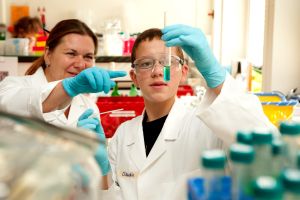The subject of “Combined Sciences” at intermediate schools conveys contents of biology, chemistry, and physics not only by lessons of the individual subjects, but also by comprehensive, close-to-practice scientific education. KIT’s contact studies on “Combined Sciences” are intended to support teachers of this subject. Learning modules focus on energy, materials, information, and the “Spacecraft Earth”, for instance.
Modern teaching of sciences goes beyond selective networking of disciplines and considers issues in a multidisciplinary manner from the perspectives of biology, chemistry, and physics. The subject of “Combined Sciences” has been main subject for all pupils of grades 5 to 10 of intermediate schools since 2004. It extends beyond the limits of individual subjects by a holistic approach based on typical working methods. “Initially, teachers of intermediate schools study individual disciplines,” says Gerald Machner, Head of the Division for the Education and Advanced Training of Teachers of the Baden-Württemberg Ministry of Education, Youth, and Sports. “The contact studies help them design a modern, interdisciplinary lesson.” The first course with 25 participants started on January 19 and will run until December 2011. Other courses will follow from 2011 to 2015.
Training is based on blended learning with alternating phases of computer training and course attendance. An internet platform has been set up with modules on central issues like energy, materials, information, and “Spacecraft Earth”. The participants are assisted by technically specialized and didactic teletutors. Four attendance phases of two days each focus on the acquisition of methodological, didactic, and experimental competences. The Remote Studies Center of the House of Competence (HoC) of KIT makes available the virtual learning environment and provides technical and organizational support. “Work with the online platform has the side effect that teachers can try out the functions they would like to use in their own lessons later on,” says Daniel Weichsel, Director of the Remote Studies Center.
Gerald Machner points out that good cooperation between school and university is the prerequisite for such a training. “Life-long, extra-occupational learning requires periodical scientific input. Teachers constantly need access to latest findings.” The Baden-Württemberg Ministry of Education relies on its successful cooperation with KIT: From 2003 to 2005, contact studies on “Natural Sciences” for secondary general schools and intermediate trade schools were organized, contact studies on “Natural Science and Engineering“ at grammar schools followed in 2006.
The third cooperation partner of the contact studies on Combined Sciences are the Chemistry Associations of Baden-Württemberg that give scientific working at intermediate schools a high priority. “This training does not only network teachers with each other, but also allows for an exchange of information with representatives of industry that is not provided elsewhere,” says Daniel Weichsel.
In close partnership with society, KIT develops solutions for urgent challenges – from climate change, energy transition and sustainable use of natural resources to artificial intelligence, sovereignty and an aging population. As The University in the Helmholtz Association, KIT unites scientific excellence from insight to application-driven research under one roof – and is thus in a unique position to drive this transformation. As a University of Excellence, KIT offers its more than 10,000 employees and 22,800 students outstanding opportunities to shape a sustainable and resilient future. KIT – Science for Impact.

